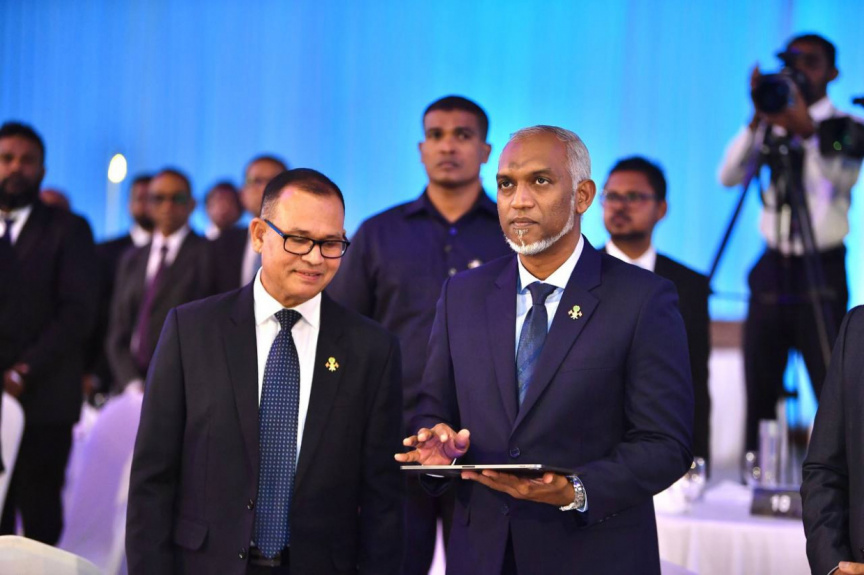
President Dr. Mohammed Muizzu with Minister of Cities, Local Government and Public Works Adam Shareef Umar. (Photo/President's Office)
Both the Kulhudhuffushi City Council and the Laamu Atoll Gan Council have formally requested the repeal of recent amendments to the Decentralization Act, asserting that these modifications compromise the financial autonomy of local councils.
The government has put forth five proposed amendments to the Decentralization Act. These legislative changes include provisions that could restrict the authority of councils to recruit employees, lease lagoons and land within their jurisdiction, and implement development projects.
In an official statement, the Kulhudhuffushi City Council contended that the amendments are designed to curtail financial independence, ownership of resources, the provision of rural services, and infrastructure development. Consequently, the council stated that elected officials serving five-year terms would be unable to fulfill their commitments to their constituents, thereby infringing upon the rights of both councilors and the populace. The council further argued that these changes contradict the Constitution and the fundamental principles of decentralization. The Kulhudhuffushi City Council has urged the withdrawal of the bill, or, failing that, has called upon Members of Parliament to vote against it in the public interest.
The Laamu Atoll Gan Council also issued a statement, insisting on the removal of the bill from parliamentary consideration.
The Maldives Democratic Party (MDP) has consistently opposed the government's amendments to the Decentralization Act. The party characterizes the government's actions as an attempt to undermine the decentralization framework that the MDP established during its tenure in power.
Fayyaz Ismail, Chairman of the MDP, stated that with the proposed amendments, councils would lose their financial independence, leading to the collapse of the decentralization system and forcing councils to become subservient to the central government. Abdullah Shahid, President of the MDP, asserted that the current government's proposed amendment to the Decentralization Act is intended to re-centralize the financial and natural resources of councils, effectively subjugating the populace.
The proposed bill introduces five key amendments. Local authority companies would be restricted to essential rural infrastructure projects (investments exceeding MVR 10,000,000) and would be required to cease competition with private enterprises within 90 days of the amendment’s enactment. Councils would be prohibited from charging rent for land or buildings utilized for basic public services and would receive revenue after state tax deductions, provided they are not delinquent in public service payments for more than six months. The amendments also mandate that councils maintain bank accounts in accordance with Ministry of Finance procedures and provide statements upon request. In their final year, councils would face restrictions on new employee recruitment, leasing land, lagoons, or reefs, and initiating new development projects not previously specified in council development plans.
The government's proposal aligns with similar discussions from the past, and the 20th Parliament, which holds a supermajority for the current government, has previously amended the Decentralization Act on multiple occasions.